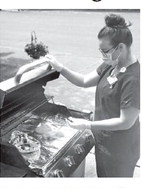Aspirus Dietitian offers simple steps for safe grilling


Summer and grilling go hand-in-hand. But summer is also a prime time for food poisoning—the bacteria that can cause foodborne illnesses to multiply faster in warm weather and cooking outdoors poses more challenges for handling food safely. One of the most efficient ways you can protect yourself and your family from food poisoning, advises Aspirus health experts, is to keep your raw and cooked foods separate.
“While prepping for your backyard barbecue, it’s important to keep your cold food cold and you’re your hot food hot,” said Taylor Mattson, registered dietitian for Aspirus. “Undercooked meat and poultry can carry a variety of foodborne illnesses, such as Salmonella and E. coli. Eliminate the guesswork by using a food thermometer to make sure your meat is cooked all the way through.”
To protect your hungry guests from a nasty bout of food poisoning, Mattson offers the following steps when firing up the grill: 1. Start with a clean grill. Always remove charred food from the grill before cooking. This reduces the risk that fresh foods will be exposed to bacteria.
2. Refrigerate. Keep meat, poultry, and fish in the fridge until you’re ready to grill. Then only take out what you’ll cook right away.
3. Separate. Don’t use the same platter, cutting board or utensils for raw and cooked foods. For example, use one plate for bringing raw meat, poultry, or fish to the grill and a different one for taking cooked food off the grill. That way bacteria in raw food and its juices can’t contaminate cooked food.
4. Use a food thermometer. This handy kitchen gadget will ensure your meat, poultry and fish is cooked to a safe internal temperature that is hot enough to kill harmful bacteria.
Use the following healthy cooking temperatures as a guide for your next cookout:
• Beef and lamb: 145 degrees
• Fish: 145 degrees.
• Hamburgers and other ground beef: 160 degrees.
• Poultry: 165 degrees.
5. Mind your marinade. Marinades are a good way to flavor raw meats, fish, and poultry. It may be tempting to use leftover marinade on food after it has been cooked, but it can be risky. Bring the marinate up to a boil to kill any harmful bacteria before you reuse it.
6. Don’t make dish towels do double-duty. Using the same hand towel several times to clean your hands and spills on the grill can spread germs. Use paper towels or disposable wipes instead. Reach for a dish towel only if you’re going to dry clean dishes or wipe your hands after washing them.


